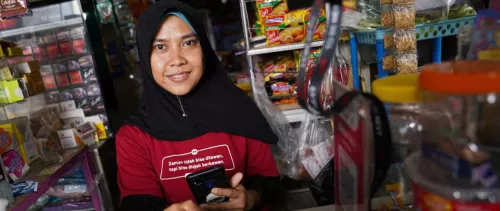
BANGKOK, February 22, 2022—Accelerating the pace of digital and disruptive technologies while promoting a circular economy approach in key industries can generate up to $3.4 billion through investment flows, savings, and revenues for Thailand, according to a new World Bank Group report. These market opportunities will also support the nation’s climate goals and contribute to a resilient growth trajectory.
The Thailand Country Private Sector Diagnostic (CPSD) report, by the IFC and the World Bank, says the country needs to foster a new innovation-led growth model while addressing existing investment constraints to create better jobs and achieve its goal of becoming a high-income country.
“With COVID-19, digital and disruptive technologies have been key in keeping businesses afloat,” said Arkhom Termpittayapaisith, Finance Minister of Thailand. “The adoption and expansion of these approaches can help Thailand harness the market power of global megatrends, such as automation and economic decarbonization, propelling Thailand to move to higher value added domestic and global value chains.”
Going forward, the report finds, accelerating the adoption of digital technology can bring in an estimated additional capital flow of $1.8 billion to Thailand annually. Most of it would come from new investments in mobility tech, big data and analytics, health tech, digital media, and entertainment, and from the expansion of sectors where Thailand is already well-positioned among regional peers, including e-commerce, fintech, and others.
“While investing in market enabling infrastructure, Thailand needs to build skills for the future,” said Birgit Hansl, World Bank Country Manager for Thailand. “We need to equip young people to become the next generation of coders, digital creators, and tech entrepreneurs to drive Thailand’s resilient, sustainable, and inclusive growth path.”
The report further finds the adoption of a circular economy can generate cost savings and additional revenue—of as much as $1.6 billion—for the private sector, especially in traditional sectors such as food and agriculture, construction, and electronics. Also, Thailand could explore a range of areas including regenerative farming, organic waste products, and others, for high-impact circular economy opportunities.
“To pursue its vision of high growth, Thailand also needs to address key investment and sector-specific constraints impacting the private sector,” said Jane Yuan Xu, IFC Country Manager for Thailand and Myanmar. “Critical reforms will help create high-quality jobs, increase female labor participation, develop innovative markets, and generate sustainable growth.”
The report highlights that strengthening structural reform implementation will help create an enabling environment for businesses, promote investments in digital innovation and circular technology. Building on existing analysis and extensive consultations, accelerated reforms are urgently needed in the following areas: promoting market competition, removing restrictions to foreign direct investments, enabling access to innovation finance, and expanding skills for the future.
About the Country Private Sector Diagnostic (CPSD)
The World Bank Group's Country Private Sector Diagnostics aim to identify sectors where private sector solutions can create or expand markets and make substantial contributions to development impact. The diagnostics use a structured approach to analyze key sectors with unrealized private sector potential in each country, select several sectors for deeper analysis, and make recommendations for policy action. The sector analyses, conducted with significant input from teams across the World Bank Group and from external partners including governments, provide valuable information on the challenges and opportunities to better leverage the private sector to achieve developmental objectives. The CPSD aligns with the World Bank Group's Maximizing Finance for Development (MFD) approach, which looks to private sector solutions to reach the 2030 Sustainable Development Goals.
About the World Bank
The World Bank provides financing, global knowledge, and long-term commitment to help low- and middle-income countries end poverty, achieve sustainable growth, and invest in opportunity for all. We comprise the International Bank for Reconstruction and Development (IBRD), the world’s largest development bank, and the International Development Association (IDA), one of the largest sources of funding for the world’s poorest countries. With the other World Bank Group institutions as well as partners across the public and private sectors, we are helping build solutions to the global challenges of the 21st century in all major sectors of development. A world where no one lives in poverty and everyone has the opportunity for a better life is within our reach.
About IFC
IFC—a member of the World Bank Group—is the largest global development institution focused on the private sector in emerging markets. We work in more than 100 countries, using our capital, expertise, and influence to create markets and opportunities in developing countries. In fiscal year 2021, IFC committed a record $31.5 billion to private companies and financial institutions in developing countries, leveraging the power of the private sector to end extreme poverty and boost shared prosperity as economies grapple with the impacts of the COVID-19 pandemic. For more information, visit www.ifc.org.


